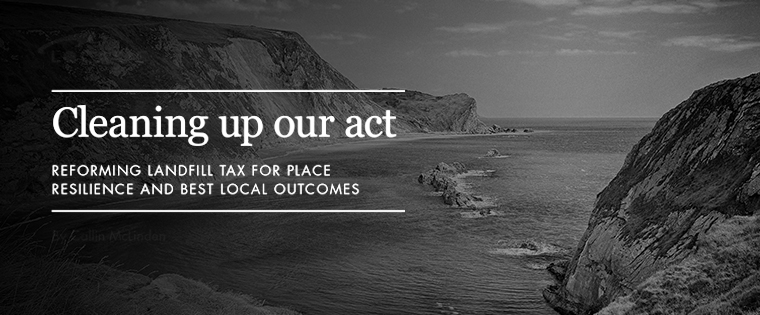Cleaning up our act
Reforming landfill tax for place resilience and best local outcome
Author: Callin McLinden |

Over the last thirty years landfill policy has been among the most successful and singularly effective of government environmental policies. Since its introduction, the UK Landfill Tax has succeeded in drastically reducing mixed municipal waste to landfill by 90 percent. However, there is a principled, place-based case for future long term policy reform to address the following challenges to successful landfill policy. Perverse incentives and misaligned policy risk encouraging behaviours which are harmful environmentally, socially and economically. Cleaning up our act provides an overview of the key challenges and barriers to efficiency in the current system and presents some possible reforms to bring the landfill tax into line with the policy landscape of the 2020s.
Key points
The UK Government instituted the landfill tax in 1996 with the primary objective of reducing the reliance on landfill sites for waste disposal. The intervening period has seen major reductions in waste to landfill achieved and significant revenue collected for the Treasury. Yet the policy landscape in 2024 is vastly different from that of 1996. Nationally, we must continue on the journey to a circular economy by reducing the disposal of biodegradable wastes or wastes that can otherwise be reused, recycled or recovered to landfill to the absolute minimum, without pretending that there are not materials out there – from asbestos to hazardous chemicals – which cannot viably be reused, recycled or recovered at a large scale and are better safely contained in a highly engineered, modern landfill site.
Unintended consequences and inefficiencies
- An unintended consequence of setting the landfill tax at a prohibitive level, with a large differential between the higher and lower rate, is the escalation of waste crime, particularly in the form of illegal dumping or fly-tipping, and the misclassification of waste. Despite multiple initiatives launched in recent years, there are significant issues undermining the efficacy of regulatory measures. Investigation and prosecution remain limited, with penalties often not reflecting the financial benefits derived from illegal activities. This issue is exacerbated by the Environment Agency’s funding being overly reliant on grants, statutory charges, and levies, impacting its operational capacity to effectively enforce waste regulations. Furthermore, the closed nature of system – where funding provided via environmental permit subsistence fees is ringfenced for the inspection of permit holders, and therefore does not cover those who operate illegally without a permit – widens the gap in oversight.
- For the year 2021, the tax gap for landfill tax was calculated at 22.7 percent or £200m, indicating inefficiency in tax collection. The absence of a middle band or further bands within the landfill tax system potentially undermines the tax’s effectiveness in promoting sustainable waste management, due to limited price signals acting as a deterrent, reduced incentives for waste minimisation, the oversimplification of waste categories, and missed opportunities for innovation, research and development. The simplicity and supposed fairness of a split between active and inactive waste in the tax rate comes at the cost of economic distortions, including market fragmentation, and a decrease in tax revenues.
Understanding ecological impacts and the waste hierarchy
- The issue of legacy chemicals within landfills, notably poly-chlorinated biphenyls (PCBs) and per/polyfluorinated substances (PFAS), colloquially known as ‘forever chemicals’, presents an escalating environmental impact. These substances, once commonly used in numerous applications and disposed of in landfills for decades, are now recognised for their enduring environmental and health impacts due to advancements in scientific understanding. The situation underscores the need for additional funding and a strategic approach to manage the legacy of chemical contamination, ensuring landfill sites are treated responsibly to safeguard public health and the environment.
- The current classification of waste into active and inactive categories, as dictated by the UK’s landfill tax legislation, has inadvertently fostered practices that are at odds with the waste hierarchy’s core objective of achieving best overall environmental outcome. There is discrepancy between the landfill tax’s classification system, overseen by the Treasury, and the methodology used to classify waste for regulatory purposes in legislation overseen by Defra.
Recommendations
Reform of the landfill tax should seek to incorporate the waste hierarchy to ensure only the right waste materials end up in landfill, by implementing variable tax rates or other policy mechanisms based on the environmental impact of waste types and necessity of landfill, to incentivise sustainable disposal choices for non-hazardous and biodegradable waste.
- As a means to this end, government should introduce an intermediate tax band to bridge the gap between the standard and lower rates, reducing the incentive for misclassification of waste and promoting fairer taxation.
- There is also a need to allocate a portion of landfill tax revenues to fund research and development aimed at advancing technology for waste recovery, reuse and recycling, as well as for legacy cleanup and to allocate a portion to funding the prevention of waste crime.
- The Environment Agency needs an expanded budget, and associated targets, for prosecuting waste criminals, with on-the-ground enforcement necessary to match recent increases in attention to the financial aspect of waste crime.
- Government must enhance local authority powers to enforce waste regulations, including increased fines and penalties for fly-tipping, with revenues to support local clean-up efforts and landfill site development. Councils must also be given the responsibility – with associated funding – to assist private landowners who are the victims of fly-tipping in safe, responsible disposal.
- Building on positive recent steps, government must continue to increase transparency and efficiency in tax collection to combat high levels of tax evasion and avoidance, possibly through stricter enforcement measures and improved monitoring technologies.
Research sponsored by:

